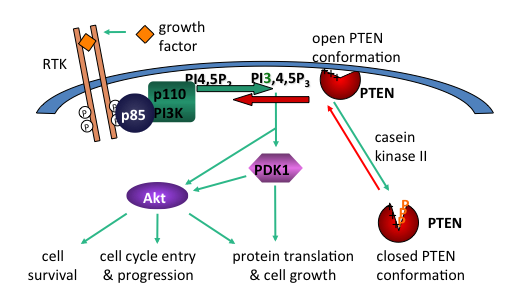PI3K/PTEN pathway in Cancer

The phosphatidylinositol 3-kinase (PI3K) pathway is frequently overactive in cancer cells. This results in enhanced cell growth, survival and proliferation promoting tumor development. The level of phosphatidylinositol 3,4,5-trisphosphate (PI3,4,5P3) lipid is increased through activation of the p110 catalytic subunit of PI3K and decreased by the corresponding lipid phosphatase PTEN. The p85 protein regulates both p110 and PTEN stability and catalytic function, playing a dual role in this pathway. Our work has focused on the binding and regulation of p85 with PTEN (Chagpar et al., 2010; Anderson, 2010). We have proposed that the distribution of p85 between p85:p110 and p85:PTEN complexes determines the amplitude and duration of PI3K signaling.
In the search for cancer-associated defects of components within the PI3K/PTEN pathway, the genes encoding p110α (PIK3CA; amplified or activating mutations) and PTEN (lost or inactivating mutations) have been a major focus. More recently, mutations in p85 that can impact the regulation of p110 or PTEN have been shown to also contribute to oncogenesis.
